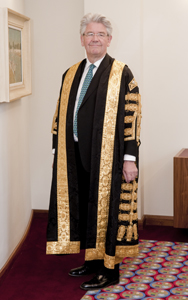If Parliament (that Supreme Constitutional Being which gets the final say in our unwritten constitution) gives the last laugh to the Govt on an issue of judgment as to what the public interest requires, then that is the way it is and the Supreme Court has to lump it. Lord N agrees with me, but thinks that Parliament should have been clearer if that is what it meant:
Cue a quick look at section 53 FOIA - that an Information Commissioner's notice to disclose documents
“shall cease to have effect if, not later than the twentieth working day following the effective date, the accountable person in relation to that authority gives the Commissioner a certificate signed by him stating that he has on reasonable grounds formed the opinion that, in respect of the request or requests concerned, there was no failure [to comply with section l(l)(a) or (b)]."
What's not clear - that section does what Parliament put on the tin - "shall cease to have effect" - the Notice is as dead as a parrot - once the accountable person has issued a certificate (and so long as there are reasonable grounds etc which of course can be challenged by a JR in the Courts...). Its contrary to the Rule of Law to deliberately misinterpret or re-write the words of a Statute. Good old Lord Wilson (who thought Lord P in the NTV case had
strayed from the path of common sense) is spot on:
I would have allowed the appeal. How tempting it must have been for the Court of Appeal (indeed how tempting it has proved even for the majority in this court) to seek to maintain the supremacy of the astonishingly detailed, and inevitably unappealed, decision of the Upper Tribunal in favour of Page 64 disclosure of the Prince’s correspondence! But the Court of Appeal ought (as, with respect, ought this court) to have resisted the temptation. For, in reaching its decision, the Court of Appeal did not in my view interpret section 53 of FOIA. It re-wrote it. It invoked precious constitutional principles but among the most precious is that of parliamentary sovereignty, emblematic of our democracy.
He is also spot on when he distinguishes between the Court's supremacy over the Executive on what the law means, and its deference to the Executive in relation to what ought to be done in the public interest:
A power of executive override of determinations of the Commissioner, or of tribunals or courts in ensuing appeals, on issues of law would have been an unlawful encroachment upon the principle of separation of powers: see the classic judgment of Sir Edward Coke, Chief Justice, in Prohibitions del Roy [1607] EWHC KB J23, 77 ER 1342, upon the claim of King James 1 to determine issues of law. But issues relating to the evaluation of public interests are entirely different. In the words of Lord Hoffmann in R (Alconbury Developments Ltd) v Secretary of State for the Environment, Transport and the Regions [2001] UKHL 23, [2003] 2 AC 295, at para 69, the principle is that “in a democratic country, decisions as to what the general interest requires are made by democratically elected bodies or persons accountable to them”. This was the principle reflected in the first version of the Bill. In the later version Parliament sanctioned departure from it but, in enacting section 53, it no doubt continued to have in mind that the evaluation of public interests was not an exercise in relation to which the Commissioner, the tribunals and the courts, could claim any monopoly of expertise. With respect to Lord Neuberger, I cannot agree with his observation at para 96 above that in this context it is hard to differentiate between the findings of fact and conclusions of law traditionally reached by tribunals and courts, on the one hand, and their occasional excursions into evaluating the potency of rival public interests on the other.
Lord N wants a clearer sign from the apparently Delphic Parliament at Westminster? All that Lord N has done is create a ridiculous pyrrhic victory for the judiciary - because as sure as eggs is eggs the next incoming administration will amend section 53 to make it brutally clear to Lord N and any other Judge who is tempted to usurp the proper role of Parliament, that HMG will have the final say on what the public get to see under FOIA, not the judiciary. Why?
Because there are just some things which only HMG and not the Courts can judge - there are just some things which we must entrust to our democratically elected representatives and not to the judges. There are just some classes of information which only the Parliamentary accountable Executive can decide whether to release to the public or not.
That is the way it has to be and that is the way which it will be once Parliament gets round (it will probably have better things to do when it is re-summoned on 18 May 2015) to making that absolutely "crystal clear", to even Lord N's satisfaction, that section 53 means exactly what is says.......
Because there are just some things which only HMG and not the Courts can judge - there are just some things which we must entrust to our democratically elected representatives and not to the judges. There are just some classes of information which only the Parliamentary accountable Executive can decide whether to release to the public or not.
That is the way it has to be and that is the way which it will be once Parliament gets round (it will probably have better things to do when it is re-summoned on 18 May 2015) to making that absolutely "crystal clear", to even Lord N's satisfaction, that section 53 means exactly what is says.......


No comments:
Post a Comment